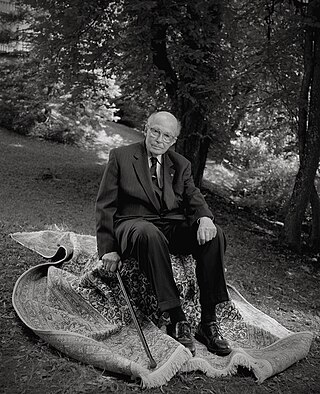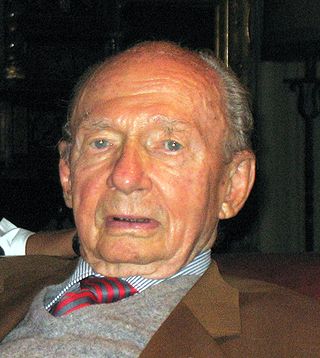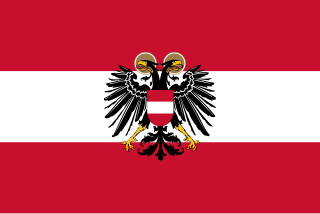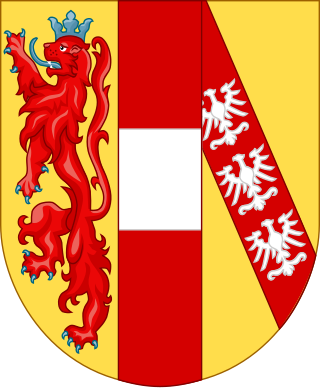Related Research Articles

Otto von Habsburg was the last crown prince of Austria-Hungary from 1916 until the dissolution of the empire in November 1918. In 1922, he became the pretender to the former thrones, head of the House of Habsburg-Lorraine, and sovereign of the Order of the Golden Fleece upon the death of his father. He resigned as Sovereign of the Golden Fleece in 2000 and as head of the Imperial House in 2007.

Zita of Bourbon-Parma was the wife of Charles I, the last monarch of Austria-Hungary. As such, she was the last Empress of Austria and Queen of Hungary, in addition to other titles. She was declared Servant of God by Pope Benedict XVI.

Charles I or Karl I was Emperor of Austria, King of Hungary, King of Croatia, King of Bohemia, and the last of the monarchs belonging to the House of Habsburg-Lorraine to rule over Austria-Hungary. The son of Archduke Otto of Austria and Princess Maria Josepha of Saxony, Charles became heir presumptive of Emperor Franz Joseph when his uncle Archduke Franz Ferdinand of Austria was assassinated in 1914. In 1911, he married Princess Zita of Bourbon-Parma. He is venerated in the Catholic Church, having been beatified by Pope John Paul II on 3 October 2004, and is known to the Catholic Church as Blessed Karl of Austria.

Karl Renner was an Austrian politician and jurist of the Social Democratic Workers' Party of Austria. He is often referred to as the "Father of the Republic" because he led the first government of the Republic of German-Austria and the First Austrian Republic in 1919 and 1920, and was once again decisive in establishing the present Second Republic after the fall of Nazi Germany in 1945, becoming its first President after World War II.
The Austrian resistance launched in response to the rise of the fascists across Europe and, more specifically, to the Anschluss in 1938 and resulting occupation of Austria by Germany.

The Austrian Civil War, also known as the February Uprising, was a series of skirmishes between the right-wing government and socialist forces between 12 and 16 February 1934 in the First Austrian Republic. The clashes started in Linz and primarily took place in Vienna, Graz, Bruck an der Mur, Judenburg, Wiener Neustadt, and Steyr, as well as in other industrial cities of eastern and central Austria.
Eduard Hedvicek was the secretary of Engelbert Dollfuß, the Austrian Chancellor before the Anschluss. On 25 July 1934 he unsuccessfully tried to prevent Dollfuß's assassination by Otto Planetta. He testified at the trial of the murderers as a "Crown" (prosecution) witness and was awarded the Gold Medal of Merit Signum Laudis by the Austrian government for his heroic efforts. He was imprisoned by the Nazis after Germany annexed Austria. His imprisonment was a matter of personal revenge for Ernst Kaltenbrunner, the SS-Obergruppenführer and Chef der Reichssicherheitshauptamtes of the Nazi government and a famous Austrian Nazi, who himself was involved in Dollfuß's assassination and was for this and other crimes hanged after the war.
Rachel Ames, née Stainer was a British novelist and journalist who wrote under the pseudonym Sarah Gainham. She is perhaps best known for her 1967 novel Night Falls on the City, the first of a trilogy about life in Vienna under Nazi rule.

George Weidenfeld, Baron Weidenfeld, was a Jewish-British publisher, philanthropist, and newspaper columnist. He was also a lifelong Zionist and renowned as a master networker. He was on good terms with popes, prime ministers and presidents and put his connections to good use for diplomatic and philanthropic ends.

Archduke Felix of Austria was the last-surviving child of Charles I, the last Emperor of Austria, and a member of the House of Habsburg-Lorraine. He was a younger brother of former Crown Prince Otto of Austria, who predeceased Felix by two months.

Rudolf von Habsburg was the sixth child and youngest son of Emperor Charles I of Austria and Zita of Bourbon-Parma.

Archduchess Adelheid of Austria was an archduchess of Austria, as the daughter of Emperor Charles I of Austria and Empress Zita.
Archduchess Elisabeth of Austria was a member of the House of Habsburg-Lorraine. She was the youngest daughter of Charles I, the last Emperor of Austria, and his wife, Princess Zita of Bourbon-Parma.

Austria, formally the Republic of Austria, is a landlocked country in Central Europe, lying in the Eastern Alps. It is a federation of nine federal states, one of which is the capital, Vienna, the most populous city and federal state. Austria is bordered by Germany to the northwest, Czech Republic to the north, Slovakia to the northeast, Hungary to the east, Slovenia and Italy to the south, and Switzerland and Liechtenstein to the west. The country occupies an area of 83,900 km2 (32,394 sq mi) and has a population of around 9 million.

The Federal State of Austria was a continuation of the First Austrian Republic between 1934 and 1938 when it was a one-party state led by the conservative, nationalist and corporatist Fatherland Front. The Ständestaat concept, derived from the notion of Stände, was advocated by leading regime politicians such as Engelbert Dollfuss and Kurt Schuschnigg. The result was an authoritarian government based on a mix of Italian Fascist and conservative Catholic influences.

The Imperial Treasury at the Hofburg Palace in Vienna, Austria contains a valuable collection of secular and ecclesiastical treasures covering over a thousand years of European history. The entrance to the treasury is at the Schweizerhof, the oldest part of the palace, which was rebuilt in the sixteenth century in the Renaissance style under Holy Roman Emperor Ferdinand I. The Imperial Treasury is affiliated with the Kunsthistorisches Museum, and houses in 21 rooms a collection of rare treasures that were compiled by the Imperial House of Habsburg over the course of centuries, including the Imperial Crown, Orb, and Sceptre of Austria, and the Imperial Regalia of the Emperors and Kings of the Holy Roman Empire, including the Imperial Crown of the Holy Roman Empire.

Archduchess Yolande of Austria was a Belgian princess of the House of Ligne, and an Austrian archduchess by her marriage to the Archduke Carl Ludwig of Austria, being the daughter of Eugène, 11th Prince of Ligne and Princess Philippine de Noailles.

Archduke Maximilian of Austria was a member of the House of Habsburg-Lorraine and the younger brother of the Emperor Charles I of Austria.

Austrian nationalism is the nationalism that asserts that Austrians are a nation and promotes the cultural unity of Austrians. Austrian nationalism originally developed as a cultural nationalism that emphasized a Catholic religious identity. This in turn led to its opposition to unification with Protestant-majority Prussia, something that was perceived as a potential threat to the Catholic core of Austrian national identity. It was also used to protect the rule of the Habsburgs.
George Eric Rowe Gedye, often cited as G. E. R. Gedye, was a British journalist and foreign correspondent for eminent British and American newspapers, who rose to prominence for his early warnings about the dangers posed by the rise of fascism in Germany and Austria.
References
- 1 2 3 4 5 6 7 8 9 10 "Gordon Brook Shepherd". The Times . 20 February 2004. Retrieved 26 May 2018.
- 1 2 3 4 5 6 7 8 "Gordon Brook-Shepherd". The Daily Telegraph . 30 January 2004. Retrieved 26 May 2018.
- 1 2 3 Hoffmann, P. (1961). "Book Review: Dollfuss, by Gordon Brook-Shepherd". Political Science. 15 (1): 69a–72.
- 1 2 Craig, Gordon A. (1964). "Western Europe". International Journal. Toronto: Canadian International Council. 19 (2): 264–266. doi:10.1177/002070206401900236. S2CID 148920468.
- ↑ "Nov 18". Kirkus Reviews . 25 February 1982. Retrieved 27 May 2018.
- ↑ "Otto von Habsburg". The Times . 5 July 2011. Retrieved 27 May 2018.
- ↑ Scheidl, Hans Werner (15 July 2011). "Otto, von Adolf Hitler steckbrieflich gesucht". Die Presse . Retrieved 27 May 2018.
- 1 2 Stourz, Gerald (1966). "Gordon Brook-Shepherd, Anschluss: The Rape of Austria. London: Macmillan & Co., Ltd., 1963. Pp. 223". Austrian History Yearbook. 2: 318–320. doi:10.1017/s0067237800003817.
- ↑ Kent, George O (1964). "Austria, Germany, and the Anschluss, 1931–1938". American Historical Review. 69 (3): 762–763. doi:10.2307/1845823. hdl: 2027/mdp.39015032024880 . JSTOR 1845823.
- ↑ Stadler, K.R. (1964). "Austria, Germany, and the Anschluss 1931–1938". International Affairs. 40 (3): 526–528. doi:10.2307/2610866. JSTOR 2610866.
- ↑ Bent, George R. (1985). Austrian National Socialism and the Anschluss (BA). Oberlin College.
- ↑ West, Nigel (2000). "Fiction, Faction and Intelligence". In Jackson, Peter; Scott, L.V. (eds.). Understanding Intelligence in the Twenty-First Century. London: Routledge. ISBN 978-0-203-50442-0.
- ↑ Cook, Andrew (2002). "The search for the real 007". History Today. London. 52 (11): 5–6.